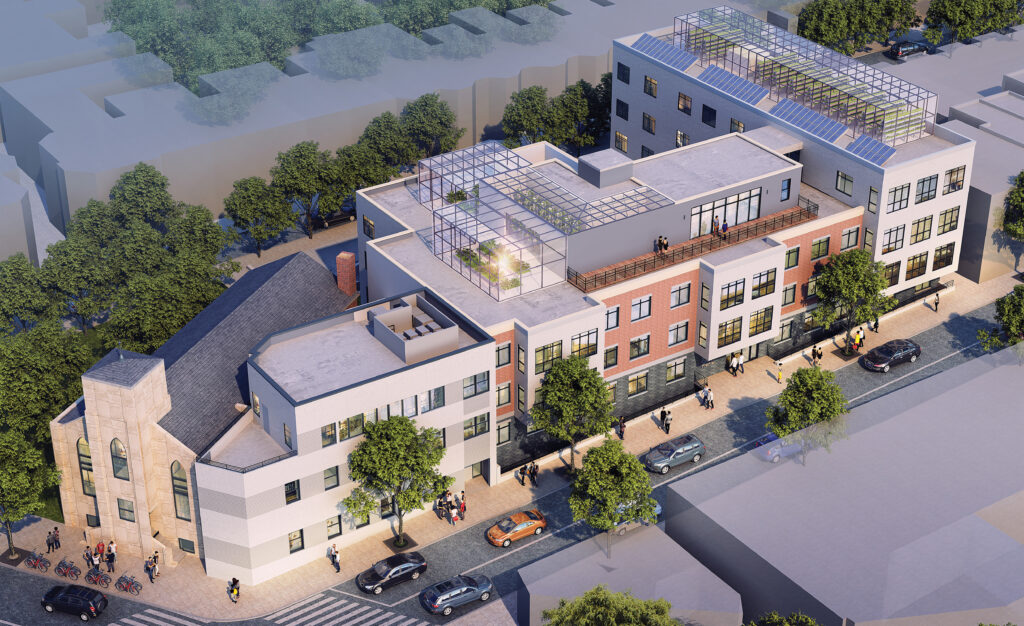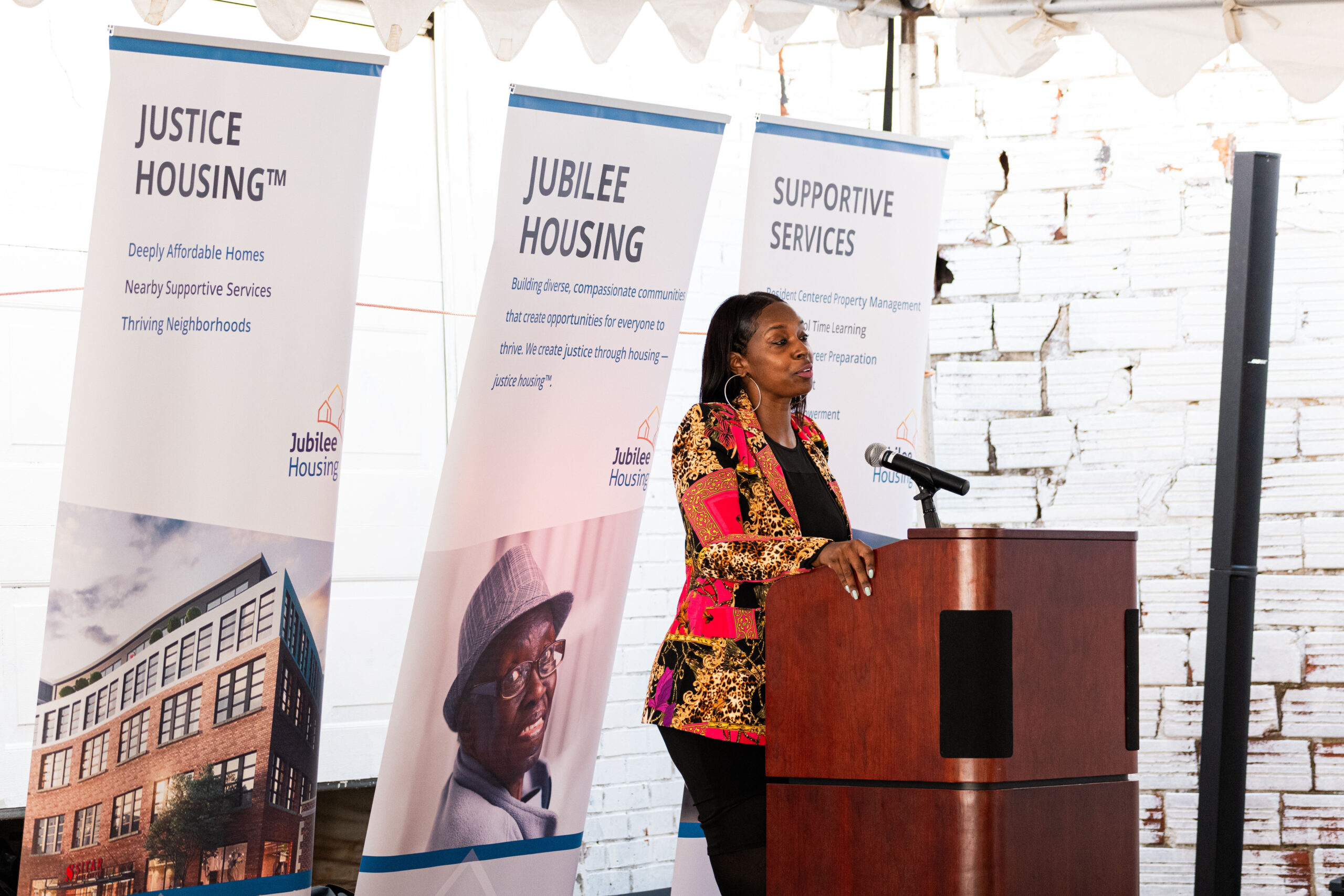For over 50 years, Jubilee Housing has worked to foster access to resources and opportunities, reduce the equity gap, and bring about justice through housing — Justice Housing. During this Jubilee Year, we have recommitted ourselves to some of our founding principles that are part of this biblical tradition: Filling Gaps, Breaking Down Boundaries, and Resetting the System. There is no better example of these values than Jubilee’s Reentry Housing and Services program and our advocacy for returning citizens through public policy and funding, a testament to our unwavering commitment to Justice Housing.
Jubilee has provided a supportive reentry housing program in the Adams Morgan area for twelve years, serving over 600 returning citizens without a single disruption to the neighborhood. The Reentry Housing Initiative provides transitional housing and wrap-around services for men and women who are looking to rebuild their lives in a supportive, drug- and alcohol-free environment. Jubilee currently operates two reentry homes, which serve up to ten women and ten men at a time, and a floor in another building dedicated to long-term housing. This month, we detail the founding of this program and talk to staff and program participants to get their perspectives.
50th Anniversary Stories
A Conversation with Gina Daye-Williams, Jubilee Housing’s Director of Reentry Housing and Services
By Dave Mesrey
Gina Daye-Williams is overseeing the expansion of Jubilee’s reentry housing and services programming at the former King Emmanuel Baptist (KEB) church and the adjacent Ontario Place apartment building, which are both under construction. These are two of the most innovative communities in the country for citizens returning to society after a period of incarceration.
Jubilee’s reentry program was founded back in 2011. How did you get involved, and what inspires you to work in this space?
My tenure began with Jubilee during the pandemic (October 2020), which was a period filled with uncertainty and challenge. I’ve worked in the field of criminal justice since I was 21, serving in various roles in federal law enforcement (community supervision) and drug court, in addition to serving as a director in several mental-health facilities, providing support and coordination for those with mild and profound developmental and cognitive disabilities.
People inspire me because we’re all on a spiritual journey that has its ups and downs; however, some might require more intricate services to move forward. Seeing people evolve and succeed motivates me to work collectively with others to expand services and create a person-centered environment to promote independence and give people a chance to flourish.
Jubilee’s new redevelopment at King Emmanuel Baptist (KEB) won’t just offer housing for returning citizens, it will also offer them services and workforce development opportunities. How does Jubilee determine what types of services it can provide, and why are they so important to the project’s success?
The KEB program model is designed to offer a continuum of housing and service opportunities for formerly incarcerated men and women who have returned to the Washington, DC area. The stigma of a criminal record is a substantial barrier in the marketplace, and incarceration also disadvantages an applicant in securing affordable housing that follows the housing first model, which is the most prevalent model in DC.
We determine what services are by implementing elements of our Justice Housing® model, which focuses on housing stability, a high sense of community, financial security and education, and improved health outcomes. We respect and appreciate that “success” on these outcomes might look different for different individuals with different goals.
Supportive services will include case management and counseling to support development of prosocial skills, recovery from mental health and substance abuse challenges, reconnecting with family, establishing and maintaining employment, and saving for the future. The community kitchen at KEB and the first-in-DC Aquaponics Farm at Ontario Place will host innovative workforce development opportunities with potential for long-term employment.

Jubilee currently operates two reentry homes that serve up to 10 women and 10 men each and another floor in one apartment building for long-term housing. How many people do you expect to be able to serve at KEB and Ontario Place?
KEB will service 18 persons annually; however, this is dependent on their length of stay. We estimate the maximum we will serve annually is 30.
Ontario Place will provide a long-term housing opportunity, with 26 units set aside for returning citizens. It will offer studio, one-, two- and three-bedroom (multi-family) units. This provides maximum opportunity for those who choose to reunite with their children and significant others.
The intended length of stay in reentry housing is about a year, with the goal of being transitioned into permanent, stable housing. What happens if there’s no long-term housing available after the year is up?
Reentry staff are extremely proactive in this regard, as we recognize affordable housing options are scarce throughout the metropolitan region, specifically in Washington, D.C. At the six-month mark of the program, all residents are scheduled for an exit-planning meeting, where we discuss their future housing plans and/or housing goals, in addition to an emergency housing plan. Collectively, we devise a charted action plan, which details action steps, responsible parties, and projected completion dates. This plan is then tracked to ensure progression to assist the individual in securing housing upon completion.
Ontario Place is going to include a state-of-the-art aquaponics farm. How will that benefit your residents?
There are no other housing facilities/programs in the DC area equipped with an aquaponics farm. This ecologically balanced system will enable us to provide fresh foods to residents in our housing communities, in addition to workforce development and possible employment opportunities.
Are your current residents interested in moving into KEB and Ontario Place? How do they feel about the aquaponics farm?
Currently, every resident in our program has made a verbal request to move into KEB or Ontario Place. They exhibit an increased level of excitement as they continue to feel a sense of hope. Our residents have been educated regarding the vision and purpose of the aquaponics farm and have asked many questions surrounding operations. The hope is that once some of them participate in hands-on training, they’ll develop a passion for this line of work, which can lead to employment opportunities.
How do you envision Jubilee’s reentry program evolving over the next few years?
Having a continuum of service is key to providing a range of service models tailored to each resident’s individual needs. Through those models, program phases are established to assess benchmarks and transition eligibility. Ultimately, residents will have increased opportunities to recover and stabilize. With a new staffing structure, we’ll have the ability to provide onsite clinical and counseling services, therefore supporting residents in crisis and decision-making processes in conjunction with individual and group therapies. We also aspire to host recurring community-based recovery meetings, welcoming individuals outside of the Jubilee community to share their special experiences and rich information.
Building capacity and partnerships is key to reentry initiatives and innovation, which work to identify gaps in systems and services. I truly believe in advocacy to assist in the development of collaborative and comprehensive strategies in an effort to address the challenges of people who struggle day in and day out with reintegration, trauma, etc. Therefore, we’re in the planning stages to increase onsite programming, which enables immediate response to crisis, assessment, financial literacy, enhanced case management, and overall recovery and well-being. Having a person-centric approach ensures the use of a holistic focus on the individual before you and meeting people where they are. Our experience is that the ultimate goal for most residents is to achieve long-term stability and well-being.
Longtime Detroit-based journalist Dave Mesrey is an SPJ Award–winning writer and editor of magazines, books, and news sites, including the Detroit Metro Times, and ESPN’s Grantland.com. In 2021, Mesrey wrote a series of stories in the Metro Times that led to the release of artist and former Golden Gloves boxing champion Ray Gray after Gray had served 48 years in prison for a murder he almost certainly did not commit.
Mesrey has also edited the biographies of Detroit sports legends Willie Horton and Lem Barney and, for BLAC Detroit magazine, chronicled the storied relationship between Lem Barney and Motown legend Marvin Gaye.

